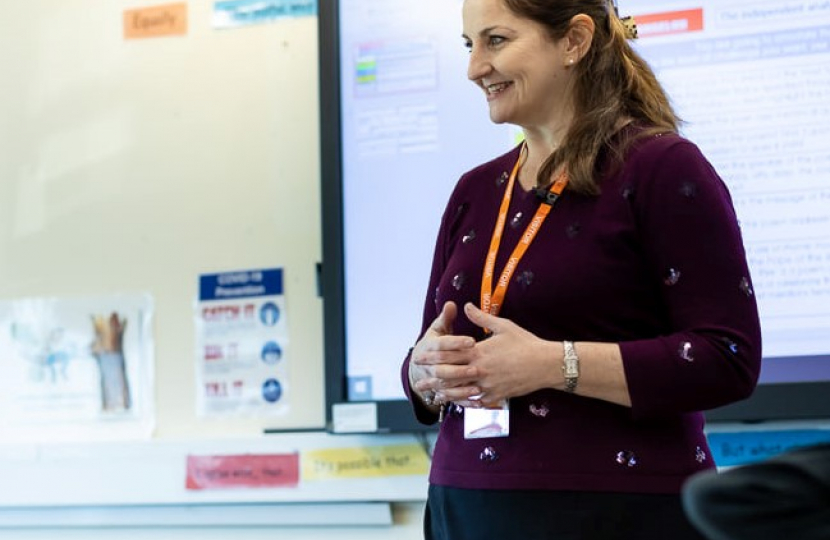
Our young people today are caught up in an unhappy paradox: whilst their concern for the natural world is greater than ever before, their ability to access nature, to discover its magic, and marvel at its wonder, has never been lower. That’s why I and others in the Conservative Environment Network are calling on the Department for Education to include a new GCSE in natural history in their Sustainability and Climate Change Strategy next month.
Like many of my colleagues, I often receive emails and letters from school children and young activists concerned about the future of our planet: from climate change and plastic pollution, to deforestation and species decline.
Yet, despite this heightened concern for the environment – and for myriad reasons – many of our young people have grown up in the absence of nature. One survey found that 83% of 5 to 16-year-olds could not identify a bumblebee, one in four could not identify a badger or robin, and almost half could not identify brambles, blackberries and bluebells.
It’s no mystery as to why this is. It is not, as some may fear, through choice. We are all born with an innate yearning for nature – what the ecologist Edward Wilson dubbed ‘biophilia’. Survey evidence shows that children enjoy spending time in the natural environment.
The sorry truth is that this generation does not have the same opportunities as previous generations to enjoy our once rich natural environment. Almost half of UK species are in long-term decline. This includes the hedgehog, whose numbers are down 95% since the 1950s. We’ve also ploughed up or concreted over large swathes of native habitat, including 97% of our wildflower meadows.
The consequence of this precipitous decline in nature is what is known as the ‘shifting baselines’ phenomenon, whereby successive generations simply become accustomed to ever-lower levels of biodiversity. Children today are unaware of the greater abundance enjoyed by those who became before them.
Education is essential to arrest this ecological amnesia and equip young people with the skills to overcome the environmental challenges we face. This has been highlighted time and again by Sir David Attenborough.
The government is already taking welcome and ambitious steps to include more nature in our national curriculum. The education secretary launched the government’s draft Sustainability and Climate Change strategy at COP26. This included improvements to the science curriculum, a virtual National Education Nature Park, and a prestigious new Climate Award to encourage young people to undertake nature-based projects in their community.
The proposal for a GCSE in natural history, which has been developed by the OCR exam board, would be a welcome addition to this strategy. It would provide a stand-alone qualification for young people craving a deeper understanding of the natural world.
There is no doubt that it would be popular. An impressive 94% of young respondents to OCR’s survey said they would like to or would have liked to have taken the qualification.
Importantly, the GCSE would fit neatly within the existing curriculum. The knowledge and skills developed by the qualification would build upon the nature observation content present in the curriculum from key stages one to three – providing a good ‘capstone assessment’ at 16 which brings these threads together in a way that existing courses in geography and biology cannot.
This includes practical field studies in nature to develop skills in observing, describing, classifying and analysing wildlife. The feedback that OCR has had from higher education institutions is that this would fill an important gap within the curriculum. The GCSE would also support vocational progression routes, such as in environmental services and land management. This would help to plug the green skills shortage.
A number of challenges are involved, as with all innovations, but they are far from insurmountable. Do we have the expertise to teach and establish the course? The answer is yes. Biology and geography teachers would be the most likely to teach the course, but OCR has interest from teachers of all subjects. We also have a world-leading non-governmental organisation community—from the Eden Project and the Wildlife Trust, to the Royal Society for the Protection of Birds—which sits on a wealth of knowledge, material and sites that can be deployed to support teachers. The outdoor study, which is integral to the qualification, is deliberately designed to be applicable in both urban and rural settings so that the course is accessible for all.
Giving young people the opportunity to achieve a qualification in natural history would send the strongest signal yet that society values the environment. Such learning and recognition will equip and empower this generation of students to rise to meet one of the principal challenges of our times. It would give the next generation the tools to be better custodians of our natural inheritance. This would be a lasting legacy for the government and our presidency of COP26, and delivers on our promise to leave the environment in a better state than we found it.

